Sword-Wielding Women of Chinese Cinema:
Films of Nora Miao Ker-hsiu & Angela Mao Ying
Overview by Paghat the Ratgirl
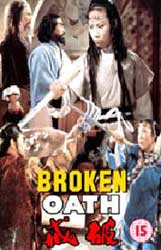 When I was a lot younger, in the 1970s & 1980s, I lived near two Japanese cinemas that showed double bills every week, plus a number of Chinese cinemas. I had weekly choices of a double-bill from Golden Harvest Theater. And I selected the costume films from among the four films shown weekly on two screens from Shaw Brothers. When I was a lot younger, in the 1970s & 1980s, I lived near two Japanese cinemas that showed double bills every week, plus a number of Chinese cinemas. I had weekly choices of a double-bill from Golden Harvest Theater. And I selected the costume films from among the four films shown weekly on two screens from Shaw Brothers.
Then there was an independent theater that showed Taiwan films, two each Wednesday as that theater was Japanese on weekends. There was even a theater that showed exclusively films from the Communist mainland, & a theater that showed two Philippino films per week. All this before considering what showed in the film revival theaters or on college & university capuses.
I became steeped in Asian cinema, lived it, breathed it, even wrote some novels published by Ace Books & others inspired by it. I wore a strange amalgam of black Kung fu trousers & Japanese hippari jackets, & for a while even went about very eccentrically wearing a beautiful sedgehat & high wooden geta. It's suprising what you can get away with when you're young!
When ethnic theaters began to vanish in the late 70s & early 80s, I thought I'd die. For years it was not possible to find good Chinese & Japanese films except the worst Kung fu chop-sockies on fuzzy VHS with crapulistic dubbing that made characters sound more like Huckleberry Hound & Donald Duck than medieval heroes & heroines.
God bless the the DVD revolution. And god bless the "brown market" where sincere fans burn illegal copies of otherwise unavailable titles to share cheaply. It's not the same as seeing them on Huge Screen at Shaw Brothers or Golden Harvest cinemas, but it's good enough.
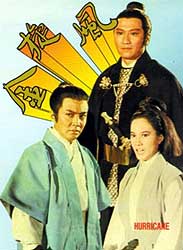 If a film had action & costumes, I simply adored them, & adore them still, though I'm pickier nowadays & more annoyed by the really bad ones. one of the most joyful of joyful things was the number of brave heroic women who populated Hong Kong & Taiwan films. The best of these films are great works of art, like Helen Ma as the Deaf Mute Heroine, or Cheng Pei-pei as The Lady Hermit, or Hsiu Feng in that Cannes & Academy Awards winning Touch of Zen. If a film had action & costumes, I simply adored them, & adore them still, though I'm pickier nowadays & more annoyed by the really bad ones. one of the most joyful of joyful things was the number of brave heroic women who populated Hong Kong & Taiwan films. The best of these films are great works of art, like Helen Ma as the Deaf Mute Heroine, or Cheng Pei-pei as The Lady Hermit, or Hsiu Feng in that Cannes & Academy Awards winning Touch of Zen.
Well, those great artistic classics I'll discuss in other essays. For the moment I want to present an overview of the films of two of the most famous martial arts actresses of the 1970s, Nora Miao & Angela Mao, who gained international reputations by right of having co-starred in Bruce Lee films when he became a household name throughout the world.
Many of their films were seen even in Drive-in movies way out in the middle of Skunkville America, not just in Chinatowns or International Districts of major American & Canadian cities. Truckloads of rednecks got crushes on girl fighters, while their moms & sisters hoorayed when gals kicked butt. These action-circuit cheapies were badly dubbed, & frequently not that good for sound even for the Chinese audiences, & they weren't the classic stuff of King Hu in Chinese or Akira Kurasawa in Japanese, but they had a certain charm.
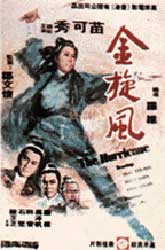 Nora Miao was heavily promoted in the 1970s in what amounted to lucky coat-tail riding on the enormous if transient international fad for Bruce Lee. Nora Miao was heavily promoted in the 1970s in what amounted to lucky coat-tail riding on the enormous if transient international fad for Bruce Lee.
She had roles in Bruce's The Big Boss (Tang shan da xiong, 1971) & most importantly in Fist of Fury (Jing wu men, 1972) & The Way of the Dragon (Meng long guojiang, 1972), in which she became the first & only actress to have an on-screen kiss with Bruce.
Lo Wei's The Hurricane; aka, Gold Cyclone Whirlwind (Jin xuan feng, or Gam suen fung, 1972) from Golden Harvest is set in the Sung dynasty. The Hurricane places one of the finest action-actresses of the 1970s, Nora Miao Ker-hsiu, in a powerful fighting role.
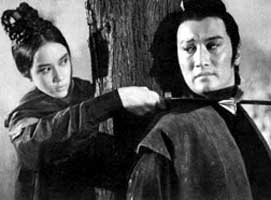 Though it was modern kung fu boxing films that made Nora Miao well-known world-wide, affici0nados always preferred her in costume action pics. Though it was modern kung fu boxing films that made Nora Miao well-known world-wide, affici0nados always preferred her in costume action pics.
Director Yen Tung-chu or "Teddy" Yip Wing-cho directed the delicately humorous The Blade Spares None (Dao bu liu ren, or Diy bat lau yan, 1971).
The villain is a prince who tests great swordfighters before allowing them into his service, after which he makes them disguise themselves as bandits & steal treasure for him.
Some of his carefully selected vassals have vanished over time, & nobody ever heard from them again. The heroic figures thrown into this horrific mystery include most significantly Nora Miao Ker-hsiu as the swordswoman leading a raid against the evil prince.
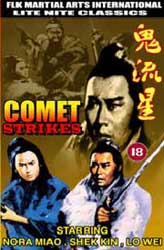 The Comet Strikes (Gui liu xing, 1971) brings Nora Miao together with her Hurricane co-star Hsieh Hsien for action in a phony haunted mansion. The Comet Strikes (Gui liu xing, 1971) brings Nora Miao together with her Hurricane co-star Hsieh Hsien for action in a phony haunted mansion.
The cast has a number of faces familiar to regular viewers of such films, including Sammo Hung, & Lo Wei who was an action star before he was a director.
She appears in many other wuxia swordplay films sometimes as the support-star for another swordswoman figure such as played by "Pearl" Cheung Ling or Angela Mao or Shih Szu, elsetimes as the primary leading lady.
Plus she continued to appear in modern-setting boxing films right into the early 1980s, including as Jackie Chan's occasional co-star. When given a chance to do battle, she never fails to thrill as a screen presence.
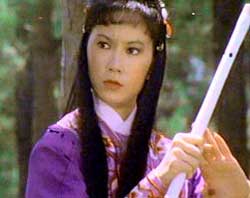 If it has a swordwoman in it, I'm a sucker for it, but it isn't always as rewarding as I'd like. If it has a swordwoman in it, I'm a sucker for it, but it isn't always as rewarding as I'd like.
Mask of Vengeance (Fung lau chaan kim huet miu han, 1980) is just a "bit too late" on the scene to compare favorably to the golden age equivalents from the 1960s & 1970s. It has two tough swordfighting gals in it, Shih Szu & Nora Miao.
The only dvd copy I could find in a jiffy was dubbed full frame, rather than in the original language & subtitled letterbox, & I'm sure it would come off better with a remastering & proper presentation. As it is, it's for "watching all that girl action" without engaging the thinking part of the mind that wants something that can pass as a storyline.
These gals try their best to make up for a badly conceived plot. Many of the individual ingredients are quite colorful -- the golden-masked villain, the cripple in the well -- yet it fails to hold together as a good film.
Vastly to be preferred is the splendiferous costumer Clans of Intrigue (Chu liu xiang, 1977). It's an ensemble cast wandering about in a confusingly branching storyline. Nora Miao is a highlight of the cast, playing Kung Nan-yen, a fighter from a matriarchal palace. Her character sets the action in motion when she alleges that a certain master thief, Chu Liu-hsiang (Li Tung), is guilty of the murder of three martial arts masters.
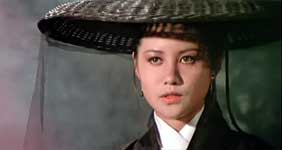 Nora Miao has been misled. Not given to unreasonableness, she gives Chu Liu-hsiang a month to clear his name. The actual killer, disguised in an operatic costume, has stolen a rare toxin belonging to the women's palace, & has framed Chu Liu-hsiang. Nora Miao has been misled. Not given to unreasonableness, she gives Chu Liu-hsiang a month to clear his name. The actual killer, disguised in an operatic costume, has stolen a rare toxin belonging to the women's palace, & has framed Chu Liu-hsiang.
Other women in the cast include Ching Lee (Chin Li) as Black Pearl who is one of the master thief's disciples, & Betty Pei Ti as Yin Chi who is in love with both the swordswoman Kung Nan-yen & the swordsman Chu Liu-hsiang.
Characters in kung fu cinema who exhibit traits of transsexuality, lesbianism, & bisexuality are not all that uncommon, but Clans of Intrigue was one of the first to place the theme central to the chracters' interactions & motivations. For a more detailed review or much more than Nora Miao's role, follow the link a couple paragraphs above.
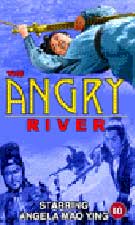 Angela Mao, like Nora Miao, came to larger notice in the west during the Bruce Lee craze, appearing in Bruce's American-funded Enter the Dragon (Long Cheng hu dou, 1973). Angela Mao, like Nora Miao, came to larger notice in the west during the Bruce Lee craze, appearing in Bruce's American-funded Enter the Dragon (Long Cheng hu dou, 1973).
She was soon accessible to western viewers in a handful of modern kung fu boxing films, though occasionally at low-budget drive-in theaters there'd be a dubbed wuxia swordplay film too. It was considered lowbrow entertainment but fact is some of her films deserve more respect, though they should be viewed in Chinese with subtitles for best effect.
Angela Mao Ying's first film was Angry River (Gui nu chuan, 1970), in which she is already getting the star treatment as the primary character. In this, the heroine must survive encounters with both mortal & supernatural foes, using wit & weapons, to claim the Black Herb to save her wounded father. (A parallel to that plot element is also signal The Legend of Madame White Snake).
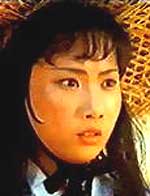 Angry River was the very first feature production of Golden Harvest, the studio that would for some years rival Shaw Brothers. The new company was eager to create its own superstars so went all out with Mao Ying. It is a wonderful film well-paced with good characterization & phenomenal action. Angry River was the very first feature production of Golden Harvest, the studio that would for some years rival Shaw Brothers. The new company was eager to create its own superstars so went all out with Mao Ying. It is a wonderful film well-paced with good characterization & phenomenal action.
Angela, still a teenager, is an inexpressibly beautiful screen presence whose physicality & swordplay is completely convincing. She sets out for Soul Valley, a nearly inaccesible region beyond the Angry River, a river that erupts in fire when disturbed (though the film's title is also broadly symbolic of Angela's character).
The story elements are largely realistic before getting across that river, & again largely realistic on the return journey. But while in Soul Valley, it is pure heroic fantasy. God-like warriors stand in the way of the Black Herb of Longevity, & in a weird cavern she even encounters a mini-Godzilla who knows kung fu.
Actually, the horned rubber suit is a duplicate of the one battled by Hercules in Hercules the Invincible (1960) & while the action is in Soul Valley, the film greatly resembles a number of Hercules films.
The kung fu dinosaur provides the campiest moment of a film which in its greater portion prefers a bit more reality. Our heroine fights her way nearer & nearer the Black Herb & just when it is in reach, she is defeated by a guardian demigod, & deprived of her chi power so that she might never again fight.
Having at last learned that force was never the way to gain the assistance of the defenders of the herb, she pleads her case on the basis of mercy, & is given leaves to take away with her.
However, deprived as she is of her chi, the journey back is one of trepediation. Indeed she gets a bit annoyng at times hiding in the bushes shivering with fear, reliant on good men to save her from bandits. This is a long patch of the story when she is protected foremost by the selflessly heroic Long Yu Han (Kao Yuan).
The journey was a thousand li each way. Upon her return, she finds her father dead & entombed, their home abandoned, a nearby warlord (Pai Ying) having killed everyone.
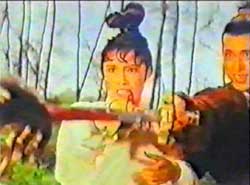 S-wearing vengeance, Angela uses the Black Herb for herself, regains her chi, & sets out with Long Yu Han for the final scenes of duels in a brilliantly orchestrated two-against-all mass slaughter, the choreography having been arranged by two of the industry's best, Ying Chieh Han & Sammo Hung. S-wearing vengeance, Angela uses the Black Herb for herself, regains her chi, & sets out with Long Yu Han for the final scenes of duels in a brilliantly orchestrated two-against-all mass slaughter, the choreography having been arranged by two of the industry's best, Ying Chieh Han & Sammo Hung.
Sad to report, as with several of Angela's films, as I write this review this one's only available in a remastered widescreen edition without subtitles. There's a pirated version making the rounds with subtitles but it about the poorest quality imaginable with only about thirty percent of the subtitles readable, the picture murky & washed out, & severely cropped.
The fuzzy faded screen-capture shown near this paragraph has been "improved" in photoshop; the dvd is just so much worse. But movie itself is such a fine one that even this poor pirate can't destroy its enjoyability, & will have to do until someone, soon I hope, releases a restored widescreen optional subtitles dvd edition.
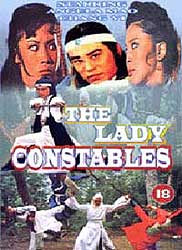 Lady Constables (Lady Karate, 1977) is too campy to regard a fine film, but at least it is campy with strong women. Lady Constables (Lady Karate, 1977) is too campy to regard a fine film, but at least it is campy with strong women.
Angela is Ying Hung Tien, a "scarf-fighting" heroine alongside another great action gal, Chia Ling (aka Judy Lee) as Lin Tang who wields a fierce police baton. Together they are out to make some difficult arrests, & recover the stolen pearls for the prince.
Angela & Chia both studied for the highly acrobatic Chinese opera when they were kids in the same school together, & they had a real friendship behind the performance.
The story tends to be kind of goofy & some of the action is comical rather than awesome. But with two action-gals for the price of one, it all kind of makes up for the hokiness.
Their fight choreography is loads of fun, though much of it is of the "wire fu" variety & so not convincingly real.
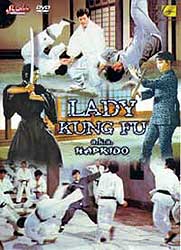 Angela Mao was briefly hands-down the most popular Chinese action heroine in the west, though in Hong Kong & Taiwan she was outpaced by others. Angela Mao was briefly hands-down the most popular Chinese action heroine in the west, though in Hong Kong & Taiwan she was outpaced by others.
The Bruce Lee connection means modern boxing films would be most seen. Hap Ki Do or as one word Hapkido (He qi dao, 1972) was not a swordswoman movie, but a modern kung-fu setting which skyrocketed Mao to fame in her right, winning her the lasting sobriquet of "Lady Kung Fu" which also became an alternate title for this film.
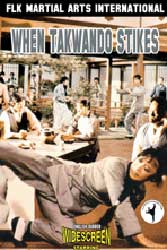 Hapkido is not actually any great shakes though Sammo Hung & Carter Wong & the gorgeous Angela are certainly fun to watch. Hapkido is not actually any great shakes though Sammo Hung & Carter Wong & the gorgeous Angela are certainly fun to watch.
For western film-goers, though, the idea of a kick-ass kick-boxing gal like Angela was revelatory, & it was films like this that got feature articles written about kung fu films even in such politicking feminist journals as Ms. Magazine.
Angela starred in many kickboxing films. When Taekwando Strikes, aka, Sting of the Dragon Masters (Tai quan zhen jiu zhou, 1973) has the kick-boxing savioress battling the evil Japanese.
It can be a little offensive in its attitudes toward Japan, but this is nevertheless classic trash, with loads of fast fighting, & a little bit of sword-fighting in addition to the empty hand for Angela.
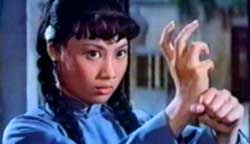 The amazing "blood sport" style film The Tournament (Zhong tai quan tan sheng si zhan, 1974) deserves to be one of Angela's better known boxing films. The amazing "blood sport" style film The Tournament (Zhong tai quan tan sheng si zhan, 1974) deserves to be one of Angela's better known boxing films.
Angela looks sweet but serious in her braids & blue kung fu trousers, & her flying kicks are splendid, her cat-claw stances as pretty as they are threatening. Inexplicably it's one of her more obscure films.
A martial arts academy is in debt to the Chinese mob's loan tactics. So the teacher & his sons agree to participate in a deadly full-body-contact sport in Thailand, Kung fu vs Muay Thai.
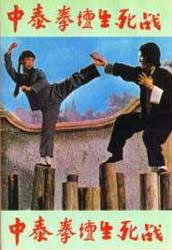 Those hard kicks to the spleen weren't what our Chinese fighters were trained to cope with. The Kung fu practitioners do not do very well against Muay Thai. One of the sifu's (teacher's) sons dies from the experience, & the sifu ends up committing suicide over his loss & humiliation. Those hard kicks to the spleen weren't what our Chinese fighters were trained to cope with. The Kung fu practitioners do not do very well against Muay Thai. One of the sifu's (teacher's) sons dies from the experience, & the sifu ends up committing suicide over his loss & humiliation.
It's up to Angela Mao to avenge the sifu against the mobsters who put the old gent & his sons in such jeopardy for their own gambling interests.
But first she must make a pilgrimage to Thailand to confront & learn the secrets of the Muay Thai boxers herself.
Angela had an enormous fan base in Thailand so it was quite natural to do a story that assumed Thai boxing had superior attributes from which a great fighter like Angela Mao could improve her Chinese kung fu, much as she catered to her large Korean fan base in When Taekwondo Strikes.
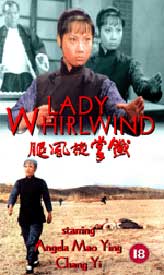 Lady Whirlwind aka Deep Thrust aka Deep Thrust: Hand of Death (Tie zhuang xuan fent tui, 1972) shows Angela becoming a tai chi expert who sets out to avenge her ruined baby sister. Lady Whirlwind aka Deep Thrust aka Deep Thrust: Hand of Death (Tie zhuang xuan fent tui, 1972) shows Angela becoming a tai chi expert who sets out to avenge her ruined baby sister.
Her foe Ling Shou Hou (Chang Yi) abandoned the young lady driving her to suicide. He agrees her desire for vengeance is just, but begs her to hold off, giving him time enough to achieve his own vengeance against a group of Japanese gangsters.
She ends up helping him in his task & in the process realizes he's not at all a bad fellow, but how can she fail her sister's memory?
In its day this film was sufficiently popular that Angela became known to her fans as "Lady Whirlwind," as Angela is especially ferocious throughout.
Yet today the film is known only to hard-core kung fu film fans. Lady Whirlwind was considered sexually daring for a kung fu film of the era, & the double meaning of the alternate title Deep Thrust is intentional. But from today's viewpoint it's just about as sexually naive as action films can be.
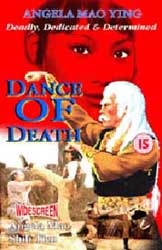 The box for the ultra-action-packed Dance of Death; aka, Eternal Conflict (Wu Quan, 1976) says Angela Mao is disguised as a boy learning kung fu, but she's actually just playing a young boy named Fei Fei. And a boy that pretty damned well better learn to fight! The box for the ultra-action-packed Dance of Death; aka, Eternal Conflict (Wu Quan, 1976) says Angela Mao is disguised as a boy learning kung fu, but she's actually just playing a young boy named Fei Fei. And a boy that pretty damned well better learn to fight!
"He" studies kung fu under two eccentric masters, one a drunkard, the other an opium addict. Fei Fei goes on a semi-comical quest to heighten his skills with sword & empty hand techniques.
He learns his best moves not from the two old masters who judge his every achievement, but from dancers in a brothel, until finally he out-masters both his dubious masters.
The fight choreography was done by Jackie Chan, whose sense of physical humor makes it into Angela's character.
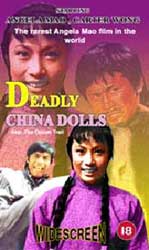 Quite a few additional empty-hand & kickboxing films could be cited for Angela Mao, for she defined that type of action heroine of the early & mid 1970s as premier modern martial artist. Quite a few additional empty-hand & kickboxing films could be cited for Angela Mao, for she defined that type of action heroine of the early & mid 1970s as premier modern martial artist.
A good example is Deadly China Dolls: The Opium Trail (Hei lu, 1973), the film that gave her secondary sobriquet after "Lady Kung Fu," "the deadly China doll."
Even in period films she tends to be an empty-hand fighter as that is what came to be expected of her performances.
In the costume actioner Iron Maiden: Legendary Strike; aka, A Fist Too Fast (Lang tzu yi chao , 1978) Angela is merely a scene-stealing guest star. She is mostly fighting empty hand, though she does take up two swords in one excellent action scene.
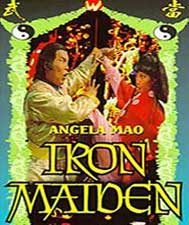 She is considered to have been the first world-wide famous action heroine, & her Bruce Lee connection did not provide for images of medieval warriors so much as the martial arts school or streetfighting films. She is considered to have been the first world-wide famous action heroine, & her Bruce Lee connection did not provide for images of medieval warriors so much as the martial arts school or streetfighting films.
For whatever reason, I trust not merely phallic, I am a much bigger fan of swordswomen than lady kickboxers. Happily when a viewer looks a little deeper into Angela Mao's starring vehicles, there are plenty of costume pics to please.
Besides her major debut in Angry River noted above -- which shows the other direction her career could have taken had she not become so associated with the Bruce Lee style of movie -- Angela takes up sword in a few other costume epics.
In The Fate of Lee Khan (Ying chun ge zhi Fenbgo, 1973) she co-stars with King Hu's favorite & beautifully stoic swordfighting actress, Hsiu Feng, & for The Invincible Eight (Tian long ba jia, 1978) she appears with Nora Miao Ker-hsiu.
Fans of endless action may find Invincible Eight slow with an incomprehensible plot. But fans of Angela & Hsiu will gasp in awe of their beauty, grace, & power when in motion.
Despite its weaknesses, it's a prettily staged film & a wonderful opportunity to see Nora & Angela fighting side by side. The story regards a murderous warlord who has an unexpected merciful moment in sparing the lives of eight harmless children, after slaughtering all the adults.
Unfortunately for him, these kids train hard & grow up to become avengers. There's a superb climactic battle sequence, though star power has to be shared thin among the numerous characters.
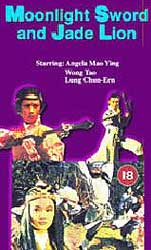 In Moonlight Sword & Jade Lion (aka, Ten Fingers & Flying Sword,1977), Angela is seeking whoever orphaned her when she was a little child. In Moonlight Sword & Jade Lion (aka, Ten Fingers & Flying Sword,1977), Angela is seeking whoever orphaned her when she was a little child.
Clad in a whirl of pink robes, she fights mainly with spear. In one of the more lighthearted fight scenes she fights with cups, table utensils & food.
Angela is absolutely gorgeous & she's the only reason to watch this one, as it's unfortunately an awful story full of confusion & story lines that stop suddenly without resolution.
But when Angela is in motion, it's fun, & her duel with fellow swordswoman Lung Chun Erh is a nice small bonus.
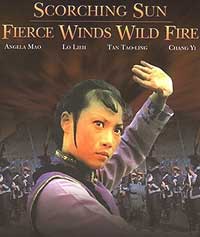 Scorching Sun, Fierce Winds, Wild Fire (aka Any Which Way You Punch, or Dragon Connection, 1979) features Angela Mao as a bandit queen pitted against an evil warlord (Chui Fook Sang). Scorching Sun, Fierce Winds, Wild Fire (aka Any Which Way You Punch, or Dragon Connection, 1979) features Angela Mao as a bandit queen pitted against an evil warlord (Chui Fook Sang).
It's a largely goofy film that has to be appreciated for its extreme absurdities, like the silly appearance in this medieval setting of a Cadillac.
It needed more of Angela's presence & since it was a period piece she should've been a weapons expert, but it's her boxing image that is exploited here.
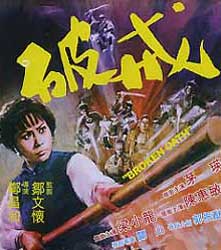 Possibly Angela's best costume action film, & certainly in the top three, is Broken Oath (Po jei, 1977). Possibly Angela's best costume action film, & certainly in the top three, is Broken Oath (Po jei, 1977).
It has a downbeat story & a gloomy heroine, Lotus Liu, named for the Pure Way Lotus Sutra. She is destined by duty & by her deepest nature to walk road of revenge
Raised in a convent by Buddhist nuns, they had hoped to protect her from her heritage of cruelty, & teach her peaceful meditation, so that she would understand vengeance was not the Pure Way.
The broad training at temple includes martial arts which Lotus takes to like a champ. But when subjected to philosophical discourses of peace & kindness, she roles her eyes, & sneaks out of the classes in order to practice her kung fu.
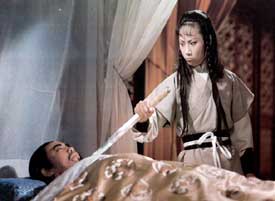 She also develops an affinity with scorpions that she treats like pets & keeps many of them hidden upon her person. When she later leaves the temple, she'll frequently use scorpions as weapons. She also develops an affinity with scorpions that she treats like pets & keeps many of them hidden upon her person. When she later leaves the temple, she'll frequently use scorpions as weapons.
Before she was born, Lotus Liu's father, the famed General Liu, was plotted against at court, & ultimately killed. His pregnant wife died in prison, during childbirth.
Her dying wish was that the infant be raised for purposes of vengeance. The "broken oath" of the title is when the mother's cellmate, upon release, has taken pity on the infant & decides not to raise her for revenge. She turns the baby over to Buddhist nuns to learn instead the Pure Way.
Yet in spite of Lotus Liu's spiritual guidance, she grew up with feelings of angst & bad temper for reasons she only later discovered.
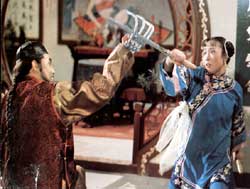 There's excellent empty-hand choreography & stick-fighting & a bit of swordplay for Angela's character. There's excellent empty-hand choreography & stick-fighting & a bit of swordplay for Angela's character.
An array of heroes & villains almost as exciting, especially Bruce Leung Siu-lung as a cool-headed government agent who's on Lotus Liu's side; Wang Li as the devoted friend & pickpocket known as Big Rat; & a host of interesting villains (including Sammo Hung) with exotic weapons.
As a young woman she finally breaks into an act of extreme fury against three would-be rapists, turning the tables & torturing them. The mother superior, shocked at Lotus Liu's capacity for unrestrained violence, banishes her from the temple.
Lotus Liu sets out to find those who betrayed her father & brought ruin to her mother. Angela Mao seems not to care if she looks scary or even horrific; she commits to the role with a fury devoid of humane feeling, unrelieved by campiness or humor.
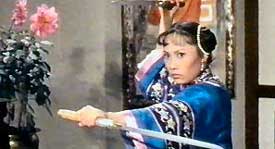 All too often, Angela Mao's films were not in all honesty worthy of her talents, but Broken Oath like Angry River should be better known, as it's a classic revenge piece of the best sort. All too often, Angela Mao's films were not in all honesty worthy of her talents, but Broken Oath like Angry River should be better known, as it's a classic revenge piece of the best sort.
This plot will be familiar to Japanese film fans as a revised remake of Kaji Meiko's great classic Lady Snowblood (1973).
While Broken Oath is not the gory aesthetic work of art that Lady Snowblood happens to be, it retains so much of that serious mode of expression that we are invited to take one of Angela's characters in deadly earnest rather than merely as an exciting fun chopsocky girl.
This overview by no means exhausts the treasures of swordswomen movies starring Angela Mao Ying or Nora Miao, not to mention many, many other action-film gals.
Reviews of swordswoman & lady boxer films are being added to the website as often as weekly. For examples: Cheng Pei-pei stars in many swordswoman films including Flying Dagger (1968), Dragon Swamp (1969), & Come Drink With Me (1966). Shih Szu was The Young Avenger (1972). Shu Pei-pei is in The Devil's Mirror (1972). Wang Ping stars in The Golden Seal (1971). Chia Ling is featured in No One Can Touch Her (1982).
Brigitte Lin fights in numerous such films including Dragon Inn (1992) & The Three Swordsmen (1994). Michelle Yeoh likewise fights in many films, including Butterfly & Sword (1993). Zhang Yiyi fights in The House of Flying Daggers (2004), as does Maggie Cheung in Hero (2002). Cecelia Cheung is impressive as The White Dragon (2004). And those are just for starters.
There are also western counterparts, though not nearly so many, & for early examples Swashbuckling Sirens of Western Cinema serves as introductory essay. And there are a great many Japanese swordswoman films, too, one of the most thrilling being Junko Fuji as The Red Peony Gambler (1968). Some additional films featuring Angela Mao or Nora Miao are linked below:
copyright © by Paghat the Ratgirl
|







 Nora Miao has been misled. Not given to unreasonableness, she gives Chu Liu-hsiang a month to clear his name. The actual killer, disguised in an operatic costume, has stolen a rare toxin belonging to the women's palace, & has framed Chu Liu-hsiang.
Nora Miao has been misled. Not given to unreasonableness, she gives Chu Liu-hsiang a month to clear his name. The actual killer, disguised in an operatic costume, has stolen a rare toxin belonging to the women's palace, & has framed Chu Liu-hsiang.
 Angry River was the very first feature production of Golden Harvest, the studio that would for some years rival Shaw Brothers. The new company was eager to create its own superstars so went all out with Mao Ying. It is a wonderful film well-paced with good characterization & phenomenal action.
Angry River was the very first feature production of Golden Harvest, the studio that would for some years rival Shaw Brothers. The new company was eager to create its own superstars so went all out with Mao Ying. It is a wonderful film well-paced with good characterization & phenomenal action. S-wearing vengeance, Angela uses the Black Herb for herself, regains her chi, & sets out with Long Yu Han for the final scenes of duels in a brilliantly orchestrated two-against-all mass slaughter, the choreography having been arranged by two of the industry's best, Ying Chieh Han & Sammo Hung.
S-wearing vengeance, Angela uses the Black Herb for herself, regains her chi, & sets out with Long Yu Han for the final scenes of duels in a brilliantly orchestrated two-against-all mass slaughter, the choreography having been arranged by two of the industry's best, Ying Chieh Han & Sammo Hung.

 Hapkido is not actually any great shakes though Sammo Hung & Carter Wong & the gorgeous Angela are certainly fun to watch.
Hapkido is not actually any great shakes though Sammo Hung & Carter Wong & the gorgeous Angela are certainly fun to watch.
 Those hard kicks to the spleen weren't what our Chinese fighters were trained to cope with. The Kung fu practitioners do not do very well against Muay Thai. One of the sifu's (teacher's) sons dies from the experience, & the sifu ends up committing suicide over his loss & humiliation.
Those hard kicks to the spleen weren't what our Chinese fighters were trained to cope with. The Kung fu practitioners do not do very well against Muay Thai. One of the sifu's (teacher's) sons dies from the experience, & the sifu ends up committing suicide over his loss & humiliation.


 She is considered to have been the first world-wide famous action heroine, & her Bruce Lee connection did not provide for images of medieval warriors so much as the martial arts school or streetfighting films.
She is considered to have been the first world-wide famous action heroine, & her Bruce Lee connection did not provide for images of medieval warriors so much as the martial arts school or streetfighting films.


 She also develops an affinity with scorpions that she treats like pets & keeps many of them hidden upon her person. When she later leaves the temple, she'll frequently use scorpions as weapons.
She also develops an affinity with scorpions that she treats like pets & keeps many of them hidden upon her person. When she later leaves the temple, she'll frequently use scorpions as weapons. There's excellent empty-hand choreography & stick-fighting & a bit of swordplay for Angela's character.
There's excellent empty-hand choreography & stick-fighting & a bit of swordplay for Angela's character. All too often, Angela Mao's films were not in all honesty worthy of her talents, but Broken Oath like Angry River should be better known, as it's a classic revenge piece of the best sort.
All too often, Angela Mao's films were not in all honesty worthy of her talents, but Broken Oath like Angry River should be better known, as it's a classic revenge piece of the best sort.